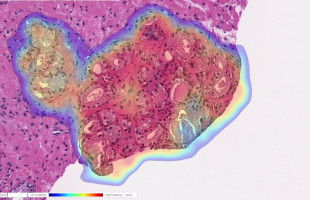
Pharmaceutical scientists, clinicians, nurses and pharmacists from the National University of Singapore (NUS) and National University Hospital (NUH) have shown that a reduced dose of abiraterone acetate is potentially as effective and safe as the standard regimen for prostate cancer patients.
Prostate cancer remains one of the most common malignancies among men. The current standard treatment involves a 1000 mg daily dose of abiraterone acetate (AA), a drug that targets hormone pathways driving cancer progression.
However, this high dose can lead to unwanted side effects and high treatment costs.
The study, led by Professor Eric CHAN from the Department of Pharmacy and Pharmaceutical Sciences, NUS, and Associate Professor Edmund CHIONG, Head and Senior Consultant from the Department of Urology, NUH, and Senior Consultant, Division of Surgical Oncology, National University Cancer Institute, Singapore, investigated whether a 500 mg daily dose of AA, taken on an empty stomach, could achieve comparable therapeutic outcomes.
In their study involving nine men with metastatic prostate cancer, they found that this lower dose resulted in comparable cancer suppression.
This was demonstrated through reduced prostate-specific antigen (PSA) levels, a marker of tumour activity, and effective hormone suppression, as supported by both patient data and computer-based pharmacological modelling.
The findings were published in the journal Cancer Communications on 20 May 2025.
This new dosing approach may allow patients to experience fewer side effects, lower their treatment costs, and maintain effective cancer control.
It could also improve treatment access and adherence, especially for elderly patients or those with financial constraints.
The research found that 500 mg AA led to a PSA reduction in all patients after 12 weeks, with over 75 per cent experiencing a drop of 50 per cent or more.
The lower dose treatment was generally safe and well tolerated.
Importantly, advanced pharmacokinetic modelling showed that even at half the usual dose, over 80 per cent of the drug's target enzyme (CYP17A1) remained inhibited, indicating strong therapeutic activity.
These findings build on prior research and support the feasibility of a scientifically guided, lower dose strategy.
The research team has launched a larger, long-term clinical trial to further validate these promising results.
Prof Chan and Assoc Prof Chiong said, “Our findings open the door to more cost-effective and safer treatment for prostate cancer patients, with minimal compromise on efficacy.”
Source: National University of Singapore
DOI: 10.1002/cac2.70035
We are an independent charity and are not backed by a large company or society. We raise every penny ourselves to improve the standards of cancer care through education. You can help us continue our work to address inequalities in cancer care by making a donation.
Any donation, however small, contributes directly towards the costs of creating and sharing free oncology education.
Together we can get better outcomes for patients by tackling global inequalities in access to the results of cancer research.
Thank you for your support.